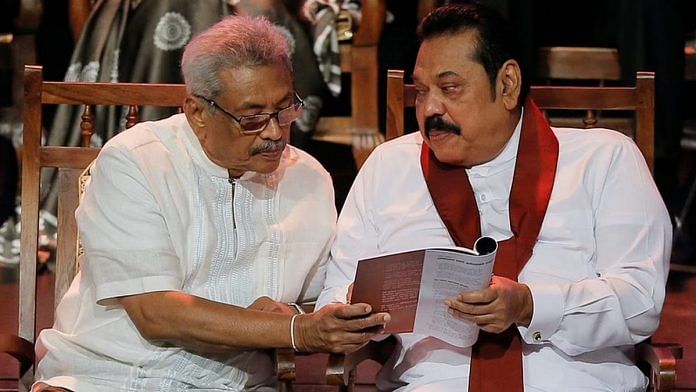New Delhi: Sri Lanka, already in the throes of a political crisis, has been rocked by fresh allegations of corruption against the Rajapaksa family at a time when the island nation finds itself scrambling to secure aid and credit lines for essentials.
According to an investigation, Namal Rajapaksa — son of Prime Minister Mahinda Rajapaksa and nephew of President Gotabaya Rajapaksa — allegedly received payoffs amounting to over a million euros from Australian firm Aspen Medical.
The opposition party Samagi Jana Balawegaya (SJB) Tuesday submitted a no-confidence motion against the government and an impeachment motion against President Gotabaya Rajapaksa to the Speaker, Mahinda Yapa Abeywardena, but it remains unclear whether the motions will pass.
Prime Minister Mahinda Rajapaksa told the press Wednesday that he is confident of winning the no-confidence vote.
The Sri Lankan Parliament met Wednesday and discussed the prevailing economic crisis. Prasanna Ranatunga, the public security minister, told Parliament that twelve protesters were arrested for hooting at MPs and trying to harass them outside the Parliament building. The protesters were later released on bail.
But the Rajapaksas aren’t the only ones affected by these allegations, which have also uncovered deepening fractures in an already fragmented opposition, made evident by its failure to unite against the incumbent government.
Also Read: Insolvent Sri Lanka should consider swapping its central bank with a currency board
Cracks in opposition
Two days after the allegations against Namal came to light, Anura Kumara Dissanayake, leader of Janatha Vimukthi Peramuna (JVP), levelled charges of corruption against several public representatives, including members of the opposition coalition.
Dissanayake, whose party occupies the Left space in the opposition, accused Leader of the Opposition Sajith Premadasa of the SJB of misappropriating 3 billion Sri Lankan rupees.
“These two parties don’t take any action against corruption. Both of them are doing the same thing; when they change power, they protect each other,” said JVP member and former MP Wasantha Samarasinghe, referring to the SJB and the Sri Lanka Podujana Peramuna (SLPP), led by the Rajapaksas.
Samarasinghe is also convenor of the group Voices Against Corruption, which he says has lodged more than 150 cases of bribery and corruption since 2011.
“We wanted to show the people that these are the people who have looted public money. We believe that until we come to power, these two parties who ruled the country for the last seven decades won’t take any action against corruption,” he added.
While Samarasinghe told ThePrint that the best option to break the political deadlock is calling for presidential and parliamentary elections, there seems to be no consensus amongst sitting MPs on the best way forward.
On 1 May, during the SJB’s May Day rally, Field Marshal Sarath Fonseka and Harin Fernando — prominent MPs and members of the opposition — almost came to blows after a heated argument.
Namal Rajapaksa denies allegations
The Australian Broadcasting Corporation’s (ABC) investigative program Four Corners further galvanised public sentiment against the Rajapaksa family by alleging that Aspen Medical laundered millions of dollars from a hospital in Hambantota, the district from where former youth and sports minister Namal Rajapaksa was elected.
“The allegations put forward by the documentary have no connection to the ongoing cases against me,” Namal Rajapaksa told ThePrint. “The previous government has brought in different allegations against our family and people known to us, but this particular transaction was initially in 2009, when I wasn’t even a member of Parliament.”
“Whoever accused me hasn’t thought about questioning the health minister at that time,” he said, adding, “I think this is a planned campaign to support the ongoing anti-government movement.”
It is unclear what transaction Rajapaksa was referring to, but the hospital project in Hambantota began in 2012, when Rajapaksa had already been elected as an MP from the district. Future Prime Minister Maithripala Sirisena was minister of health at the time, while Mahinda Rajapaksa was the President.
Sri Lanka’s history of corruption
Pointing to the fact that while the segment on Sri Lanka and the Hambantota General Hospital was only a short part of the Four Corners documentary, political analyst Dinidu de Alwis said that the larger question of holding public officials legally accountable for corruption has been an issue in Sri Lanka for some time now.
“Between anecdotes and what’s on public record, the quality of life exhibited by these public officials shows that there is non-kosher money coming in,” he said.
Between March 2020 and October 2021 alone, 17 major cases were either withdrawn by the Commission to Investigate Allegations of Bribery or Corruption or the attorney general, or dismissed in court. Of the 17 cases, 11 were against public officials involved in financial crimes.
The JVP’s press conference, despite being lauded online for drawing attention to various instances of money laundering, has been criticised by former Sri Lankan president Maithripala Sirisena, former Central Bank governor Ajit Cabral, and Prime Minister Mahinda Rajapaksa’s office.
The Prime Minister’s Office said in a statement that legal action will be taken against JVP leader Anura Kumara Dissanayake.
“The timing is off on the part of the JVP because it doesn’t feed into anything politically,” said de Alwis. “It’s not counterproductive, because public sentiment isn’t just against the government but against the establishment too.”
“But I don’t see it having a tangible impact unless legal action is taken,” he said, adding that the JVP should have uploaded the documents online for them to be available to journalists, lawyers, and the public.
JVP member Wasantha Samarasighe told ThePrint that the party does not plan on making the documents public until the cases go to court. “There are so many young people on the street fighting against the government. People are looking for details and specifics of the evidence against the Rajapaksa family, which is why we wanted to do this,” he said.
(Edited by Amrtansh Arora)
Also Read: How a powerful dynasty bankrupted Sri Lanka in 30 months



